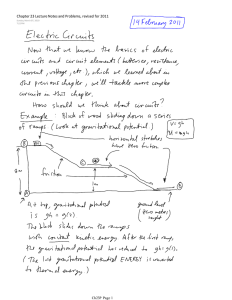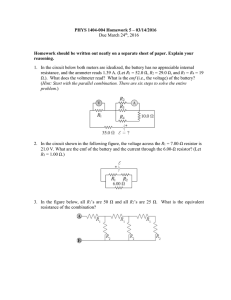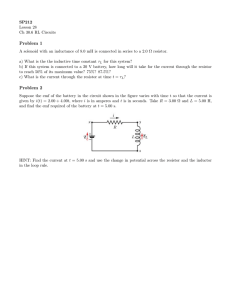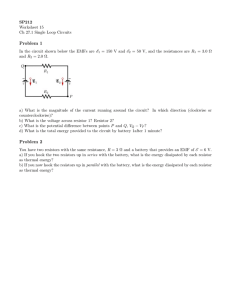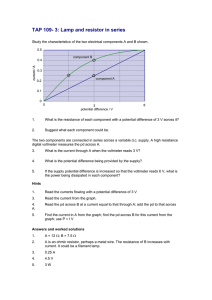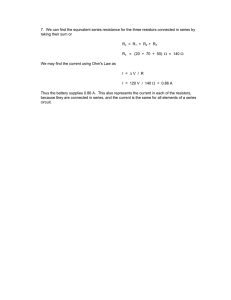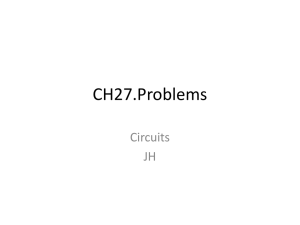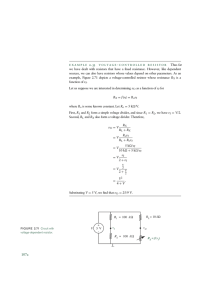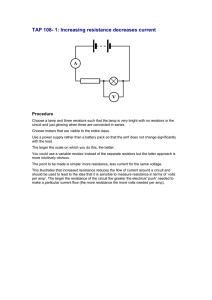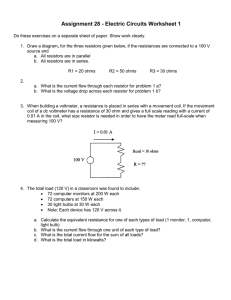1. A battery of internal resistance 2 Ω is connected
advertisement
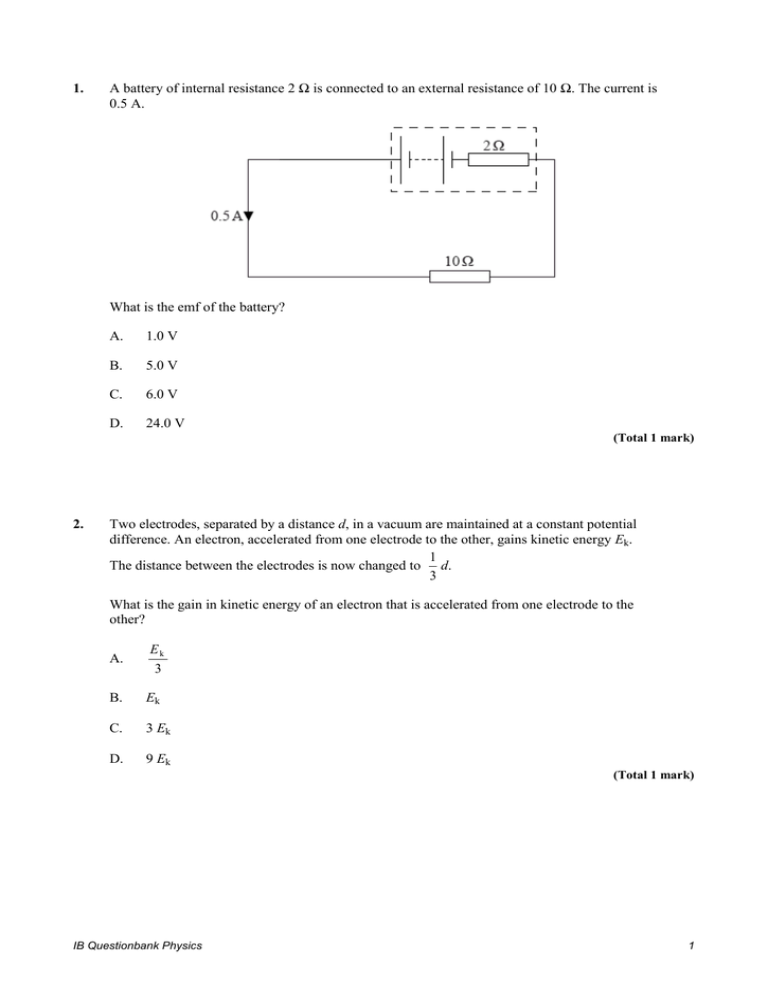
1. A battery of internal resistance 2 Ω is connected to an external resistance of 10 Ω. The current is 0.5 A. What is the emf of the battery? A. 1.0 V B. 5.0 V C. 6.0 V D. 24.0 V (Total 1 mark) 2. Two electrodes, separated by a distance d, in a vacuum are maintained at a constant potential difference. An electron, accelerated from one electrode to the other, gains kinetic energy Ek. 1 The distance between the electrodes is now changed to d. 3 What is the gain in kinetic energy of an electron that is accelerated from one electrode to the other? A. Ek 3 B. Ek C. 3 Ek D. 9 Ek (Total 1 mark) IB Questionbank Physics 1 3. The graph shows the I–V characteristics of two resistors. When resistors X and Y are connected in series, the current in the resistors is 2.0 A. What is the resistance of the series combination of X and Y? A. 7.0 Ω B. 1.3 Ω C. 1.1 Ω D. 0.14 Ω (Total 1 mark) IB Questionbank Physics 2 4. Two resistors, of resistance R1 and R2, are connected in series with a cell of emf ε and negligible internal resistance. Which expression gives the potential difference across the resistor of resistance R1? A. R1 R1 R 2 B. R1 R 2 R1 C. R2 R1 R 2 D. R1 R 2 R2 (Total 1 mark) 5. A point charge of magnitude 2.0 μC is moved between two points X and Y. Point X is at a potential of +6.0 V and point Y is at a potential of +9.0 V. The gain in potential energy of the point charge is A. 0.20 μJ. B. 1.5 μJ. C. 6.0 μJ. D. 30 μJ. (Total 1 mark) IB Questionbank Physics 3 6. A resistor of resistance 12 Ω is connected in series with a cell of negligible internal resistance. The power dissipated in the resistor is P. The resistor is replaced with a resistor of resistance 3.0 Ω. What is the power dissipated in this resistor? A. 0.25 P B. P C. 2.0 P D. 4.0 P (Total 1 mark) 7. The electromotive force (emf) of a cell is defined as A. the power supplied by the cell per unit current from the cell. B. the force that the cell provides to drive electrons round a circuit. C. the energy supplied by the cell per unit current from the cell. D. the potential difference across the terminals of the cell. (Total 1 mark) 8. A copper wire, of electric resistance R, has a length L and a cross-section area S. Another copper S wire has a length 2L and a cross-section area of . Which of the following is the resistance of 2 this wire? A. R 4 B. R 2 C. 2R D. 4R (Total 1 mark) IB Questionbank Physics 4 9. The graph shows how the current I in a resistor varies with the voltage V applied across it. Which of the following gives the resistance of the resistor, when I = I1? A. V1 I1 B. The slope of the curve at the point (V1, I1) C. I1 V1 D. The inverse of the slope of the curve at the point (V1, I1) (Total 1 mark) IB Questionbank Physics 5 10. Two 10 Ω resistors are connected as shown. What is the resistance across PQ? A. 0Ω B. 5Ω C. 10 Ω D. 20 Ω (Total 1 mark) 11. Two resistors, made of the same material, are connected in series to a battery. The length of resistor X is twice that of resistor Y, and X has twice the cross-sectional area of Y. Which of the following gives A. 1 4 B. 1 2 C. 1 D. 4 resistanceof X ? resistanceof Y (Total 1 mark) IB Questionbank Physics 6 12. The circuit shows a resistor R connected in series with a battery and a resistor of resistance 10 Ω. The emf of the battery is 20 V and it has negligible internal resistance. The current in the circuit is 1.0 A. Which of the following is the resistance of R? A. 1.0 Ω B. 2.0 Ω C. 10 Ω D. 20 Ω (Total 1 mark) 13. Three identical resistors are connected to a battery as shown. Which of the following is a correct statement? A. The current through X is greater than that through Z. B. The potential difference across Z is greater than that across Y. C. The potential difference across resistor X and Y together is the same as that across Z. D. The current through Z is less than the total current through X and Y. (Total 1 mark) IB Questionbank Physics 7 14. Two 6 Ω resistors are connected in series with a 6 V cell. A student incorrectly connects an ammeter and a voltmeter as shown below. The readings on the ammeter and on the voltmeter are Ammeter reading / A Voltmeter reading / V A. 0.0 0.0 B. 0.0 6.0 C. 1.0 0.0 D. 1.0 6.0 (Total 1 mark) IB Questionbank Physics 8 15. The tungsten filament of a lamp has a cross-sectional area A and length L. For a potential difference V across the filament, the current in the filament is I. The resistivity of the tungsten equals A. V A . IL B. IL . V A C. VL . IA D. IA VL (Total 1 mark) 16. A cell of emf ε and internal resistance r delivers current to a small electric motor. 450 C of charge flows through the motor and 9000 J of energy are converted in the motor. 1800 J are dissipated in the cell. The emf of the cell is A. 4.0 V. B. 16 V. C. 20 V. D. 24 V. (Total 1 mark) IB Questionbank Physics 9 17. In the circuits below the cells have the same emf and zero internal resistance. The resistors all have the same resistance. Which of the following gives the ratio A. 1 4 B. 1 2 C. 2 D. 4 power dissipated in X ? power dissipated in Y (Total 1 mark) 18. A cylindrical conductor of length l, diameter D and resistivity ρ has resistance R. A different cylindrical conductor of resistivity 2ρ, length 2l and diameter 2D has a resistance A. 2R. B. R. C. R . 2 D. R . 4 (Total 1 mark) IB Questionbank Physics 10 19. In the circuit below, the battery has negligible internal resistance. Three identical lamps L, M and N of constant resistance are connected as shown. The filament of lamp N breaks. Which of the following shows the subsequent changes to the brightness of lamp L and lamp M? Lamp L Lamp M A. stays the same decreases B. increases stays the same C. increases decreases D. decreases increases (Total 1 mark) IB Questionbank Physics 11 20. In the circuit below, the voltmeter has a resistance 100 k. The battery has negligible internal resistance and emf 6 V. The reading on the voltmeter is A. 0 V. B. 2 V. C. 3 V. D. 4 V. (Total 1 mark) IB Questionbank Physics 12 21. In the circuit shown below, the cell has negligible internal resistance. Which of the following equations is correct? A. I1 = 2I2 B. I1 = 2I3 C. I2 = 2I3 D. I3 = 2I1 (Total 1 mark) IB Questionbank Physics 13
